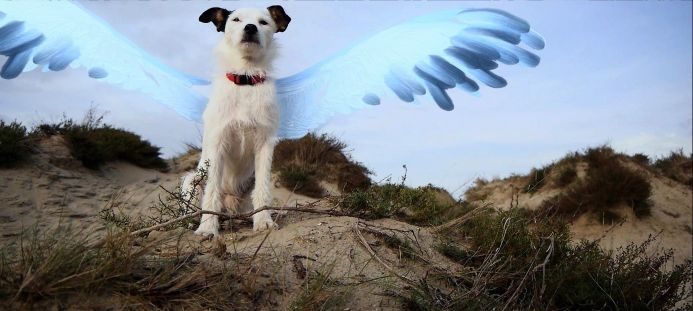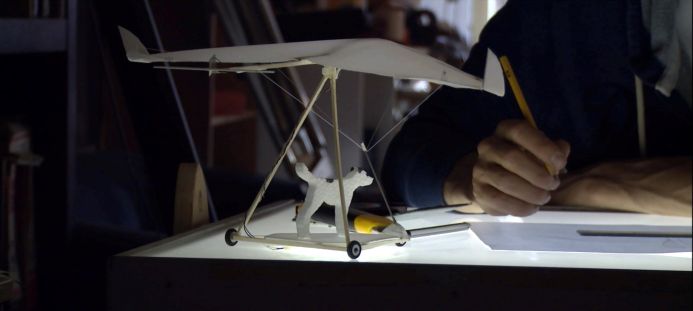Wat maakte me nieuwsgierig naar De vliegende hond van Johannes Hogebrink? Die curieuze documentaire die vlak voor de heropening van de filmzalen zijn Picl-première beleeft en nog snel een tip voor de thuiskijkers is. Misschien intrigeert het me omdat het zo’n maf idee is, dat tegelijk een tijdloze metafoor blijkt te zijn. Een hond leren vliegen met een delta-glider. Ongeveer zoals je op YouTube ook filmpjes vindt over surfende of autorijdende honden. Maar een vliegende hond was er nog niet, volgens de maker.
Zijn geadopteerde zwerfhond uit Bosnië moet in het voetspoor treden van zijn helden als vliegpionier Otto Lilienthal en het Russische ruimtehondje Laika. Tegelijkertijd denk ik zelf aan de mythe van Icarus. En als het dan bij wijze van contrast Frans Bromet is die het hondje Chayka zijn stem geeft, tja, dan wil ik het wel zien.
Daarbij wil ik wel weten waarom Hogebrink niet alleen van honden en vliegen houdt, maar ook, zoals ik ergens las, van het maken van rare films. Zijn Russische vriendin Paulina noemt hem een romanticus. Johannes ontkent het niet.
Onverwachte binnenkomer is al dat De vliegende hond niet van start gaat met honden of delta-gliders, maar met een geheimzinnig mooie animatie. ‘Alles begint met een ontsnapping’, zo klinkt de openingstekst. ‘Zoals de vogel ontsnapt uit zijn nest, het kuiken uit het ei, het ei uit de moeder, zo ontsnapt het universum als iets uit het niets.’
Ontsnappen

Dus, waar wil Hogebrink aan ontsnappen?
“Goeie vraag”, overpeinst hij als ik hem bel. “Ik denk dat het een ontsnapping is aan het conventionele bestaan. Huisje, boompje, baantje en belastingen betalen, dingen waar ik geen talent voor heb. Tegelijk zit er een filosofische kant aan. Het leven als ontsnapping aan de chaos. Levende materie is iets dat zichzelf organiseert, voortplant en groeit. Het is een soort oerdrift. Ontsnappen aan je nest, je ouders, je verleden. Daar komt de wens om te vliegen ook vandaan.”
Maar dan loert, zoals de film heel amusant toont, toch weer een nieuwe chaos. Chayka blijkt hoogtevrees te hebben. Er moet zelfs een hondenfluisteraar aan te pas komen. De producent fronst zijn wenkbrauwen en als daar in de Oostenrijkse Alpen de pers komt kijken dreigt een ramp. Of niet? Waar zal Hogebrinks koppigheid toe leiden? Het blijkt minder voorspelbaar dan verwacht. En zien we wel wat we zien?
“Tja, echt ontsnappen aan de chaos kan natuurlijk niet.”
Een baan nemen?
Waar Hogebrink nog een heel prozaïsche motivatie aan toevoegt.
“Voor mij als kunstenaar zag ik het ook als een soort noodgreep om een bestaan op te bouwen, een route naar de financiële zekerheid die nodig is om Paulina over te laten komen. Simpel gezegd, als ik naam maak met een leuke film is er kans dat ik op die weg verder kan. Anders moet ik misschien een baan nemen. Ik heb natuurlijk niks tegen mensen met een baan, maar ik ben daar zelf niet zo goed in”, zegt hij lachend.
“Het is inderdaad niet de meest voor de hand liggende weg naar meer zekerheid. Er zijn ook geen garanties, maar je moet in je leven wel iets doen waar je passie en je talent ligt. Als je dat niet probeert kan je daar je leven lang spijt van hebben.”
Op het verkeerde been
Dus een rare film maken.
“Ik hou van films die de kijker op het verkeerde been zetten, of een rare draai geven aan een bekend genre. Zodat je jezelf even achter het oor moet krabben omdat je je afvraagt ‘waar zit ik nu naar te kijken?’.
Het even schrijnende als absurde Enjoy Poverty noemt Hogebrink een mooi voorbeeld. Beeldend kunstenaar Renzo Martens reist daarin naar Congo om de bevolking te adviseren hun armoede te gaan exploiteren.
“Een geniale film, op een bepaalde manier tenenkrommend omdat je niet zo goed weet wat ie precies wil zeggen. Juist daarom een soort spiegel die je dwingt om na te denken.”

“Mijn insteek bij De vliegende hond is dat ik een omgekeerde mockumentary wilde maken. Dus niet iets dat echt lijkt maar nep is, maar juist een film die nep lijkt maar echt is. Dat leek me een interessant experiment met het documentairegenre. Het onderzoeken van de spanning die je altijd hebt met filmmaken. Wat klopt het beste met de realiteit en wat is het helderste qua verhaal. Dat is de experimentele filmstap die ik wilde zetten. Gelukkig herkende het Filmfonds dat ook.”
Lastige financiering
Maar de goede wil van Filmfonds alleen is niet genoeg.
“Het bleek heel lastig de financiering rond te krijgen. Ik loop al sinds 2011 rond met dit droomproject. Maar voor je bij het Filmfonds kan aankloppen moet je een omroep hebben die ‘ja’ zegt. Telkens was de reactie: een leuk plan, maar het kaart geen maatschappelijk urgent probleem aan. De enige die in eerste instantie interesse toonde was, grappig genoeg, de EO. Omdat het gaat over geloven in het onmogelijke, tegen beter weten in, dacht ik aanvankelijk. Maar dat was het niet.”
“Men vond het een leuk verhaal waar alleen nog ergens een referentie naar de Bijbel in moest. Daar heb ik lang over nagedacht en ik besloot tenslotte om het niet te doen. Want ofwel niet-gelovige mensen gaan denken dat het eigenlijk over Jezus gaat, ofwel gelovige mensen zullen vinden dat ik een Bijbelquote uit zijn verband trek.”
“De eerste omroep die direct ‘ja’ zei was een Oostenrijkse omroep. Zo werd het een Nederlands-Oostenrijkse coproductie.”
Passie voor docu
Johannes Hogebrink studeerde in 2010 af aan de Nederlandse Filmacademie met Devotie. Een mooi vormgegeven korte documentaire die intiem inzicht geeft in hoe vier totaal verschillende mensen hun grootste passie beleven. Maar daarvoor al en ook nu nog was en is hij ook actief als beeldend kunstenaar met een breed repertoire, zoals te zien op zijn website. Toch koos hij op de Filmacademie niet voor fictie maar voor documentaire.
“Ik weet niet precies waarom”, licht hij na enig nadenken toe, “maar ik heb me altijd al tot de documentaire aangetrokken gevoeld. Dat het gaat over iets dat echt is, terwijl de film tegelijkertijd dingen in scène kan zetten of manipuleren in de montage. Dat vond ik interessant.”
“Zie bijvoorbeeld de films van Michael Moore, die doet dat openlijk. Of de Zweedse film Surplus over de consumptiemaatschappij. Dat is ook een documentaire maar lijkt bijna een videoclip. Dan begrijp je hoe je gemanipuleerd kan worden door televisie. Daarbij komt: ik vind veel Nederlandse fictie vrij middelmatig. Wij zijn een polderlandje, te veel compromissen, te veel mensen die er een mening over hebben. Ik heb gemerkt dat de onconventionele kant van een idee er als eerste wordt afgeschaafd.”
De vliegende hond heeft hij, toen het project eenmaal liep, redelijk naar eigen inzicht kunnen maken.
“Binnen de productionele beperkingen, zes weken draaitijd waarvan alleen de eerste en laatste met de crew, heb ik inhoudelijk behoorlijk mijn eigen gang kunnen gaan. Maar om een hond alles te leren wat ik van plan was had ik minstens drie maanden en misschien wel twee zomers nodig gehad.”
Zelfportret
Dit toegangskaartje naar een prachtige carrière (Hogebrink lacht als hij dit hoort), mogen we dat omschrijven als een uit de hand gelopen kunstproject? Misschien wel een zelfportret?
“Ehhh, het was niet mijn intentie om een zelfportret te maken. Ik hou niet van ego-documenten. Maar ik ontkwam er niet aan. Dat maakte mijn crew me ook duidelijk. ‘Geef het maar toe Johannes, dit gaat gewoon over jou.’ Ik heb in de film wel een soort karikatuur van mezelf neergezet.”
“En een kunstproject? Alles wat gemaakt is om mensen te inspireren of te prikkelen om over iets na te denken kan je kunst noemen. Maar het is niet bedoeld als een hoogstaande kunstfilm. Het is bewust lichtvoetig. Het kan een leuke familiefilm zijn, fijn om naar te kijken.”
Nu De vliegende hond zijn weg naar het publiek vindt heeft Hogebrink weer tijd om te schilderen en te fotograferen. En er zijn plannen voor een animatiefilm.
“Ik hou erg van animatie. Het is alleen vet veel werk, maar dat was die vliegende hond ook.”
De vliegende hond is vanaf 28 mei te zien bij Picl en Vitamine Cineville.
